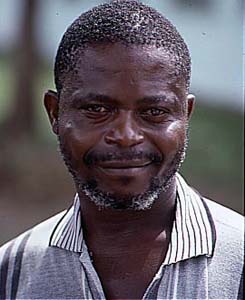Interview with RUF Colonel Augustine Gbao
Peter C. Andersen
12 June 2001 - Lunsar, Sierra Leone
Sierra Leone Web
Colonel Augustine Gbao, the Revolutionary United
Front's Chief of Security, lounges in the shade at Lunsar's Murialdo Secondary
School and complains to a Bangladeshi peacekeeper about the deployment of Sierra
Leone Army troops in the  country's northern Kambia District, where rebel forces
disarmed just last month. "According to the second Abuja Agreement, these
guys were not to deploy in these towns. They were to deploy in border
towns," he says. "And now they are occupying Kambia, Madina, Rokupr
– this baffles us." Gbao warns that if the soldiers provoke his men, the
rebels might fight back. "It is better you people try to handle this
situation," he tells the peacekeeper. "What was agreed upon, let them
move by it. We are not fools."
country's northern Kambia District, where rebel forces
disarmed just last month. "According to the second Abuja Agreement, these
guys were not to deploy in these towns. They were to deploy in border
towns," he says. "And now they are occupying Kambia, Madina, Rokupr
– this baffles us." Gbao warns that if the soldiers provoke his men, the
rebels might fight back. "It is better you people try to handle this
situation," he tells the peacekeeper. "What was agreed upon, let them
move by it. We are not fools."
But Gbao, who had arrived from the town of Magburaka only minutes before aboard a United Nations helicopter, has not come to Lunsar to argue with United Nations soldiers. He and the RUF's local brigade commander have come to see to it that their followers disarm – as quickly as possible now. "When we say disarmament we have agreed," he says. "Not that we are afraid of any force. But our people say they are tired of war – we should give them peace."
Gbao, a former police officer who says he once attended a short training course in Britain, claims he began organising for the RUF in Sierra Leone even before 1991, the year rebel leader Foday Sankoh and his followers crossed into the eastern Kailahun District and set off a decade of brutal civil war. "We started the revolution right here," he says. "We didn’t pass any other way."
Asked what the RUF had hoped to achieve through a rebellion which in ten years of conflict has left tens of thousands dead, thousands more maimed, and which has forced an estimated two million people to flee their homes, Gbao becomes suddenly vague. "Oh well, there were numerous problems in our country, especially political problems. Everything was zero in our country," he says. "And even there is nothing Sierra Leonean can be boast of today. All the numerous wealth we have, with all our numerous resources, there is nothing we can boast of in this country." Sierra Leoneans should rely on themselves, he argues, and not on the outside world. "(We should) utilise our resources the best way in the interests of our people," he says.
Gbao now points to elections scheduled for later this year, in which the RUF hopes to take power through the ballot box. "When we get into the polling, the people will have to decide," he says. "If we are suitable to govern them, then they will vote for us." And while some both inside and outside Sierra Leone have expressed skepticism that the rebels would accept defeat at the polls, Gbao insists the RUF will abide by the result of the election. "We will respect the opinion of our people," he says.
But Gbao claims he has no interest in seeking political office himself. "I’m not a politician. I’m not prepared to be a politician," he says. The rebel commander, whose uncalloused hands suggest more recent acquaintance with the gun than with the machete, says he will soon return to his home Kenema District, and to his farm. "I’ll only go back to my village and do my farming. That is what I met my father doing," he says.
